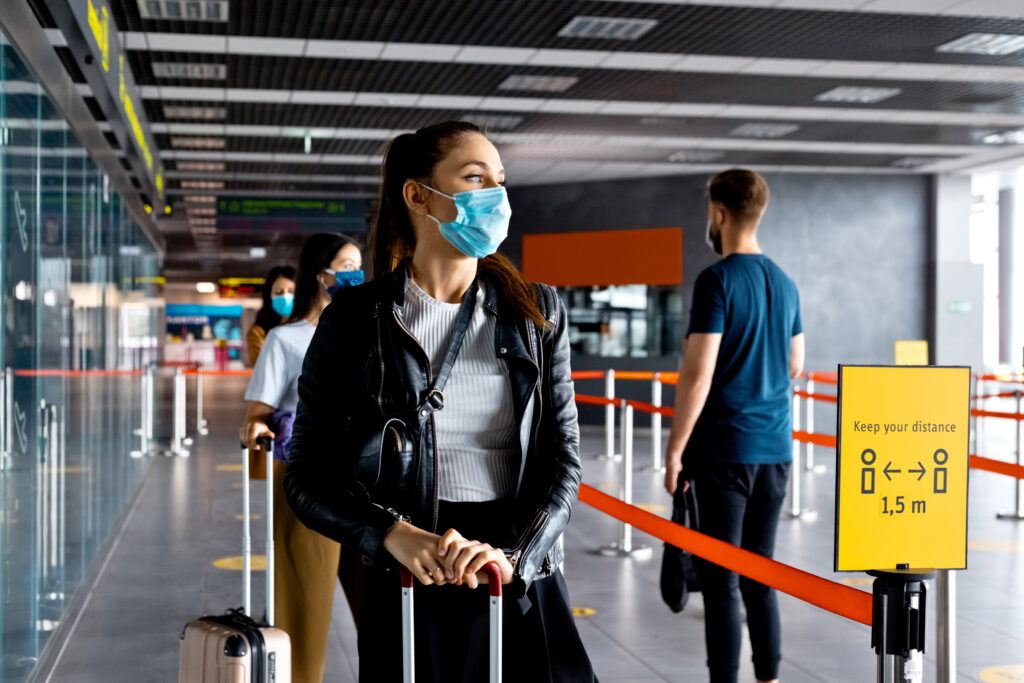Governments have been wrestling with the challenges of reopening borders and restarting economies while performing their fundamental responsibility of protecting populations and national health systems from threats related to Covid-19 and its variants.
Vaccination rates have climbed while PCR and health test verification systems have evolved to a point where seamless health status verification between governments, airlines and airports is possible. The combination presents a pivotal moment in both the fight against Covid and the struggle to kick-start idle economies.
The managed border
The best practice framework for border protection is a ‘defense-in-depth model’. This layered approach to border security means having a sequence of screening steps in place for managing risks, with the primary goal of preventing risks from reaching a country in the first place. One could assume that without the requisite controls in place, many risks go undetected. But Covid-19 and its variants spread quickly across borders and the impacts have been devastating. Some countries have managed these risks by closing borders quickly. Closing borders and imposing lockdowns are very effective ways to slow the spread of a virus such as Covid-19, but shutting borders also means shutting down critical parts of the economy, such as aviation and tourism.
Layered approach to border management
The first layer in border protection is the visa system, which now includes electronic travel authorities (ETAs), the simplest form of screening and granting permission to travel to a country. This step enables checking against watch lists and profiles before travel. Closer to the date of travel, governments receive passenger name record (PNR) data from airlines about travel bookings, providing further opportunities for risk assessment.
As part of a passenger’s check-in procedure, airlines send more current journey and confirmed identity information in the form of advance passenger information (API), or advance passenger processing (APP) data. These steps provide additional opportunities to detect and manage risks. Importantly, APP is an interactive measure between airlines and governments, meaning that airlines send check-in data to a country and stand by for a ‘boarding directive’ instruction from a government before allowing a person to travel, after check-in data is assessed against various data stores, watch lists and profiles.
APP for incoming travelers exports the border and enables a government to prevent a passenger traveling to their country. APP for departing travelers provides opportunities for countries and airlines to cooperate even further, with a departure country also providing assurance that passengers have met all requirements to leave, including in relation to their immigration status and their health.
Restarting borders with APP
While border management always requires alignment across a number of agencies with responsibility for immigration, customs and security, for example, now national health authorities are also assuming a most critical front-line responsibility for border protection. More than ever before, countries need robust border controls in place, controls that allow essential and safe travel, and controls that can be configured quickly to treat evolving risks.
As Covid spread across the world in 2020, countries with APP were able to quickly close travel routes from particular hot spots, reducing exposure to the virus in the early stages of the pandemic. Due to the rapid spread of this virus across many countries, it was eventually necessary for governments to close borders entirely. Now, with the virus under control in some countries and with increasing rates of vaccination for many others, we are at a turning point. Using APP, governments have been able to safely and very selectively reopen their borders using their ability to completely control who can embark upon a journey. With the right capabilities in place, travel routes are opened and can be closed again quickly if an outbreak occurs, or virus threats change.
Where travel bans exist, governments need to deal with a range of scenarios. While borders might be closed to certain visitors, for example, citizens need to get home. Exemptions to travel bans may also be necessary for different visa holders, such as permanent residents, diplomats and healthcare workers. We also talk about quarantine-free ‘green flights’, and quarantine-required ‘red flights’. How do you manage all these different cases? The answer is through APP configuration.
Different models for travel corridors and bubbles can be facilitated. Arrangements that rely on manual checking of PCR tests, for example, can be slow and open to fraud. There are now Health Pass apps available that offer digital assurance of health status for a person, issued by testing labs and increasingly by governments. Health Passes can be integrated with APP checks for fast assurance of PCR test results or vaccination certificates prior to travel. This kind of health check will be an important component of boarding directives as travel resumes.
Sophisticated APP systems have configurable lists of ports and visas that enable a government to block or allow boarding for different scenarios. In this way, you can prevent boarding for a tourist from a particular place, allow boarding for a citizen or resident returning home, or potentially refer the case to the government for further consideration.
Where low-risk countries decide to implement travel bubble arrangements, APP can be configured to allow passengers to depart on a ‘green flight’ if they have been in the country for 14 days, protecting the destination country as well as other passengers.
There are further possibilities for making use of APP as a critical border control layer, which could be relevant for both international borders and for regional travel. The most widely used platform facilitating boarding directives between airlines and governments has been in place for over 25 years, and is ready to support the safe reopening of borders and the resumption of travel.

